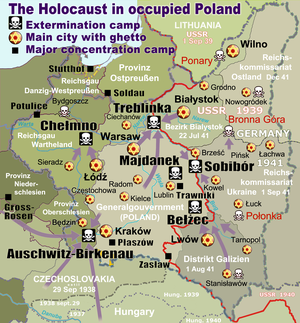Hans Frank
He took part in the failed Beer Hall Putsch, and later became Adolf Hitler's personal legal adviser as well as the lawyer of the NSDAP.
Frank, the middle child of three, was born in Karlsruhe to Karl, a lawyer, and his wife, Magdalena (née Buchmaier), a daughter of a prosperous baker.
He served also in the Freikorps under Franz Ritter von Epp's command, taking part in the crackdown of the Münchner Räterepublik.
[5] Although the DAP evolved quite soon into NSDAP (Nazi Party), Frank waited until September 1923 to become a member of the Sturmabteilung (SA), where he would eventually attain the rank of SA-Obergruppenführer in November 1937.
In November of the same year, Frank took part in the "Beer Hall Putsch", the failed coup attempt intended to parallel Mussolini's March on Rome.
In the aftermath of the attempted putsch, Frank fled to Austria, returning to Munich only in 1924, after the pending legal proceedings were stayed.
"[7] In September–October 1930, Frank served as the defence lawyer at the court-martial in Leipzig of Lieutenants Richard Scheringer, Hans Friedrich Wendt and Hanns Ludin, three Reichswehr officers charged with membership in the NSDAP.
[10] In April 1933, he was appointed Minister of Justice for Bavaria, serving until December 1934 when he was named a Reichsminister without portfolio in the Reich government.
In May 1933, Frank went to Vienna, accompanied by the Prussian Minister of Justice Hanns Kerrl and his Ministerial Director Roland Freisler, to promote Nazi propaganda.
[13] Frank objected to extrajudicial killings as it weakened the power of the legal system (of which he himself was a prominent member), both at the Dachau concentration camp and during the "Night of the Long Knives".
The Nazi ideology, especially as expressed in the Party programme and in the speeches of our Leader, is the basis for interpreting legal sources.
On 16 December 1941, Frank spelt out to his senior officials the approaching annihilation of the Jews:A great Jewish migration will begin in any case.
It was a wild and stormy period filled with terrible passions, and when a whole country is on fire and a life and death struggle is going on, such words may easily be used...
[5]An assassination attempt by the Polish Secret State on 29/30 January 1944 (the night preceding the 11th anniversary of Hitler's appointment as Chancellor of Germany) in Szarów near Kraków failed.
During the trial he converted, guided by Fr Sixtus O'Connor OFM, to Roman Catholicism, and claimed to have had a series of religious experiences.
Frank voluntarily surrendered 43 volumes of his personal diaries to the Allies, believing his struggles against other Nazi officials would be enough to secure his defence,[25] and which were then used against him as evidence of his guilt.
To his son Norman, he wrote that he preferred to die and join the "brave soldiers, who were (...) killed in this war" than "be dealt in revenge from [migrants], traitors", from those such as Willy Brandt.
During their trials, he and Albert Speer were the only defendants to show any degree of remorse for their crimes,[26] though, according to his son Niklas, he portrayed himself as a "man of the law", and was not personally acknowledging guilt, rather shifting it to the "German people" as a whole.
And, although nervous and swallowing frequently, this man, who was converted to Roman Catholicism after his arrest, gave the appearance of being relieved at the prospect of atoning for his evil deeds.
"[27] His body and those of the other nine executed prisoners and the corpse of Hermann Göring were cremated at Ostfriedhof (Munich) and the ashes were scattered in the river Isar.
[28][29][30] While awaiting execution, he wrote his memoirs, Im Angesicht des Galgens (In the Face of the Gallows), later published by his widow.
But he thought it unlikely because, "from his entire demeanor, the fact that Adolf Hitler had no Jewish blood coursing through his veins seems so clearly evident that nothing more need be said on this.
"[32] Given that all Jews had been expelled from the province of Styria (which includes Graz) in the 15th century and were not allowed to return until the 1860s, scholars such as Ian Kershaw and Brigitte Hamann dismiss as baseless the "Frankenberger hypothesis", which before had only Frank's speculation to support it.
[33] More recent scholarship by Leonard Sax points out that many Jews lived in places without official sanction and demonstrated the existence of a settled Jewish community in Graz before the law formally permitted their residence.
Frank sought a divorce in 1942, after meeting and falling in love with a former childhood acquaintance who was looking for her son, a soldier who had gone missing in the Eastern Front.
"[40] Besides making her children intercede for her with their father, she would go on to contact Himmler and Mrs. Goebbels, who would get Hitler to personally forbid Frank from divorcing his wife.
[25] Contrary to Hans' later stance on the concentration camps and ghettos, the children were not isolated from them, despite them not being a topic their parents discussed directly with them.
Niklas, who had befriended the Pole, heard this and began to cry, which made his mother stop scolding the man and start comforting her son.
The book, first of a trilogy about his family's experiences, was serialized in the magazine Stern, and caused controversy in Germany, and even in some sectors of Poland, because of the scathing way in which the younger Frank depicted his father: Niklas referred to him as "a slime-hole of a Hitler fanatic" and questioned his remorse before his execution.
Michael, the closest to Niklas in their youth, though an ardent defender of their father's innocence, would develop an addiction for milk, to the point his wife would struggle to save some for their children, and which go on to cause severe obesity and in consequence organ failure.




